Complimentary worldwide shipping on orders over $400 · No import tariffs for most countries
Complimentary worldwide shipping on orders over $400 · No import tariffs for most countries
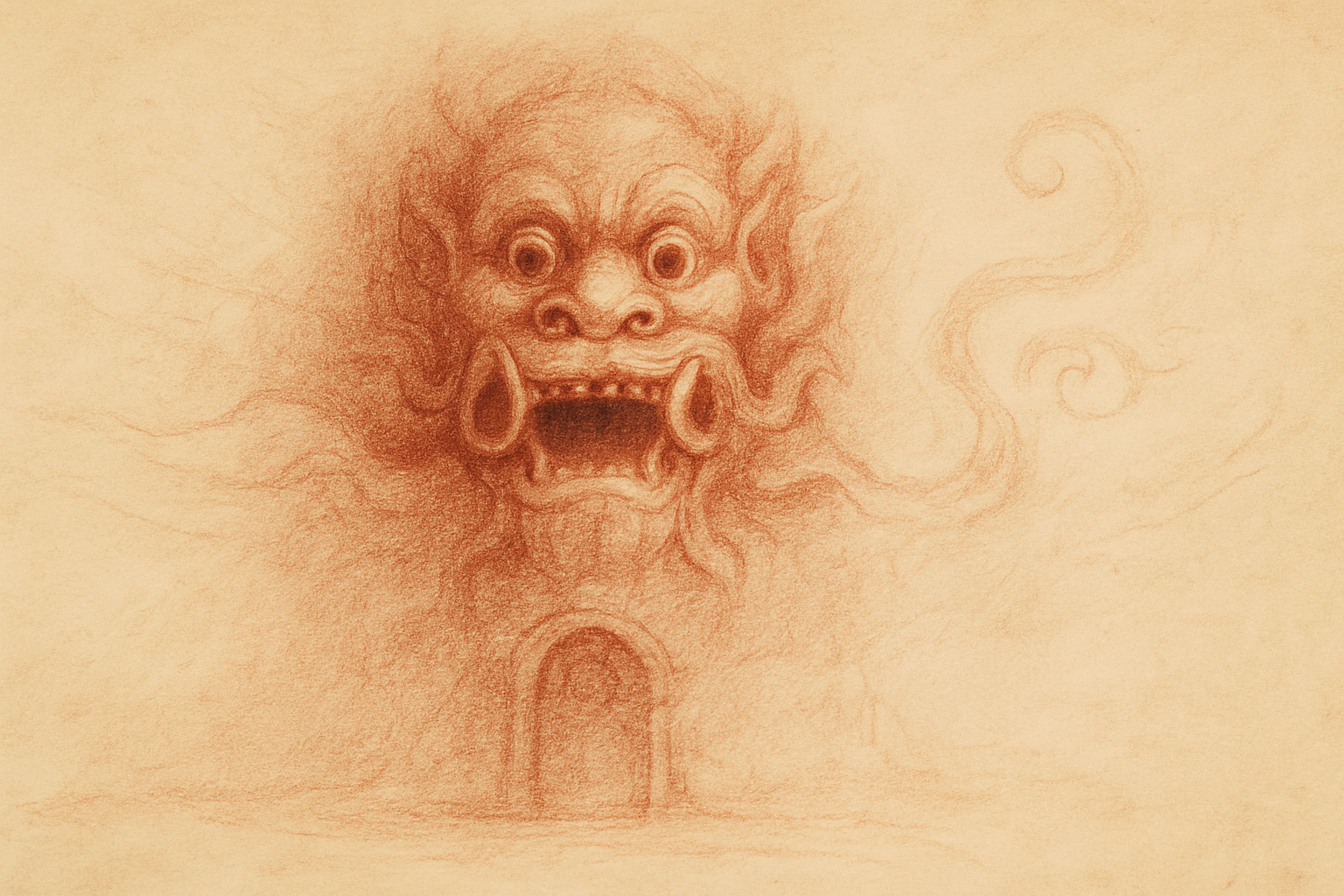
The Face That Devoured Itself
from The Serpent and the Star – Khmer Myths from the Temples of Light and Shadow
He was born with teeth to devour the world,
but chose instead to swallow his name.
—
In the time before temples had faces,
when the stars leaned closer to the earth
and the wind still carried the speech of gods,
a voice rose from the fire beyond form.
It was not a gentle voice.
It thundered through the void like a roar of becoming—
and from it leapt a being of command.
He had no name, for none dared name him.
His shape was shifting: a lion’s jaw, a serpent’s spine,
tusks of stone, and eyes like black suns.
He was wrath carved into sinew,
hunger stitched in flame.
He was not born to ponder—
only to consume.
And so the Great One—
he who sits in stillness,
who wears the river of time in his hair—
summoned this being to destroy.
“There is one,” said the god,
“who has climbed too close to light.
Go. Swallow him.
Swallow his name.”
The creature bowed without bowing.
He leapt through cloud and star,
his mouth opening wider than the sky.
Mountains trembled. Trees forgot their roots.
Even the moon dimmed its glow
as he neared the threshold of his prey.
But before fang could meet flesh,
a second voice came.
“Stop.”
The creature froze.
His breath stirred oceans.
His hunger pressed against the rim of time.
“Do not devour the other,” said the god.
“Devour thyself.”
There was no thunder now.
Only silence.
Only the weight of an undoing.
“Begin,” said the god.
“With your tail.”
—
And so the creature obeyed.
He turned—
not to his foe,
but to his own back.
And with a single bite, he tasted himself.

He turned not against the world, but into himself.
Flesh tore. Bone cracked.
He chewed, and the rage began to unspool.
He devoured his own anger first.
Then his hunger.
Then the spine that made him rise.
Then the claws that made him tear.
Then the shoulders that bore his pride.
With each swallow, the air around him softened.
With each gulp, the stars turned their faces.
He was not destroying. He was returning.
When he reached the chest,
he paused—just once.
There, a flame flickered:
a will to remain.
But the command still echoed.
And so he took the flame into his mouth,
and swallowed that, too.
—
At last, only the face remained.
Mouth open.
Eyes wide.
Frozen not in hunger,
but in stillness—
a stillness so deep it watched without watching.
Shiva—who sees all things and names none—
smiled.
“This face,” he said,
“is not a warning.
It is a gate.”
And he pressed it upon the lintels of the sacred.
—
Since that day,
it is the kala who guards the threshold.
Not with fang,
but with presence.
Not to keep the unworthy out—
but to ask the true-hearted in:
Have you devoured your anger?
Your hunger?
Your name?
Only then may you pass beneath him,
and enter the silence within.

—
He ate what he was,
until only the watcher remained.
Also in Library
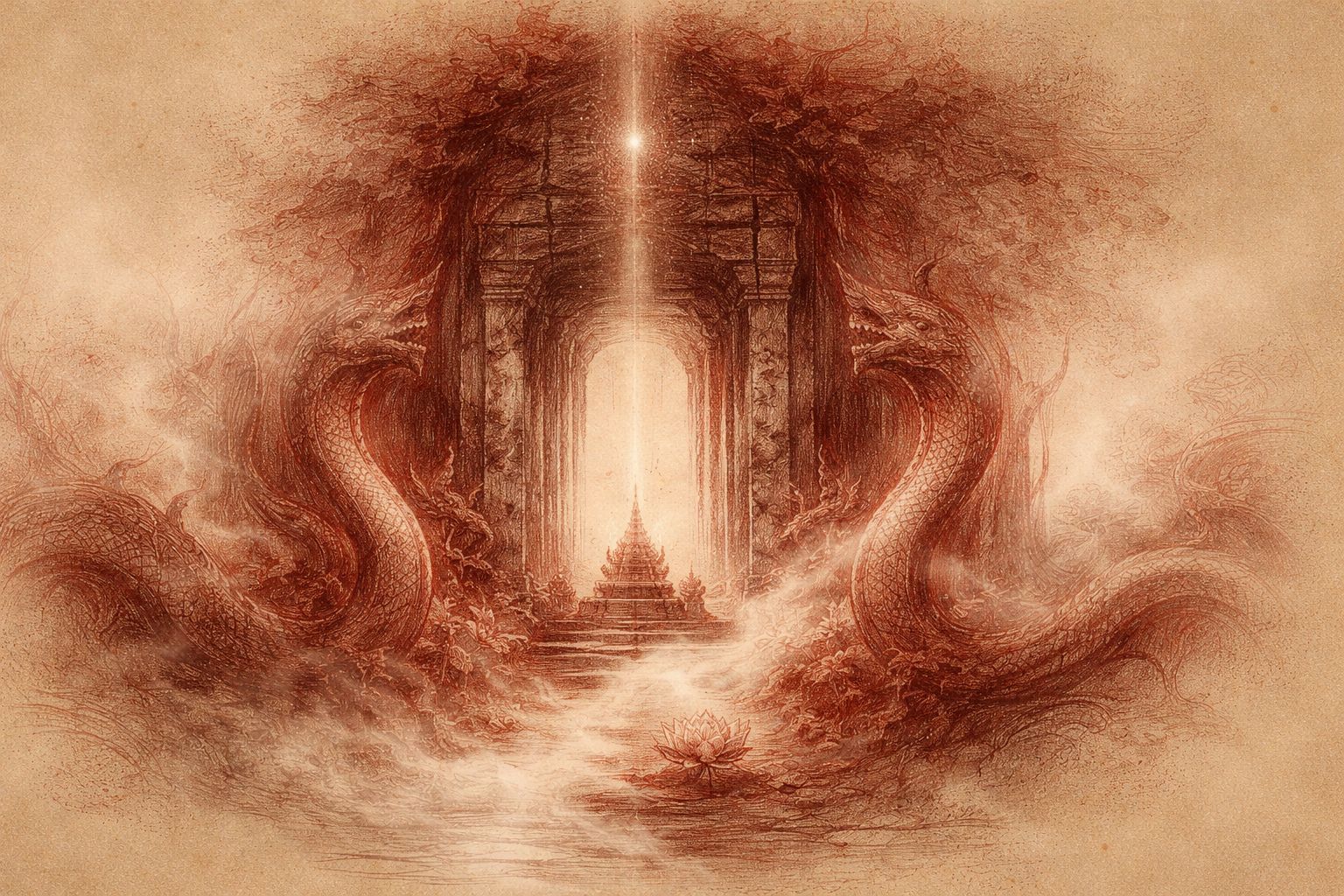
Stone That Remembers the Sky
1 min read
This poem listens to Angkor not as ruin, but as grammar—where moss, shadow, and proportion carry devotion forward without spectacle. What endures here is not glory, but measure: a way of standing that no longer needs witnesses.
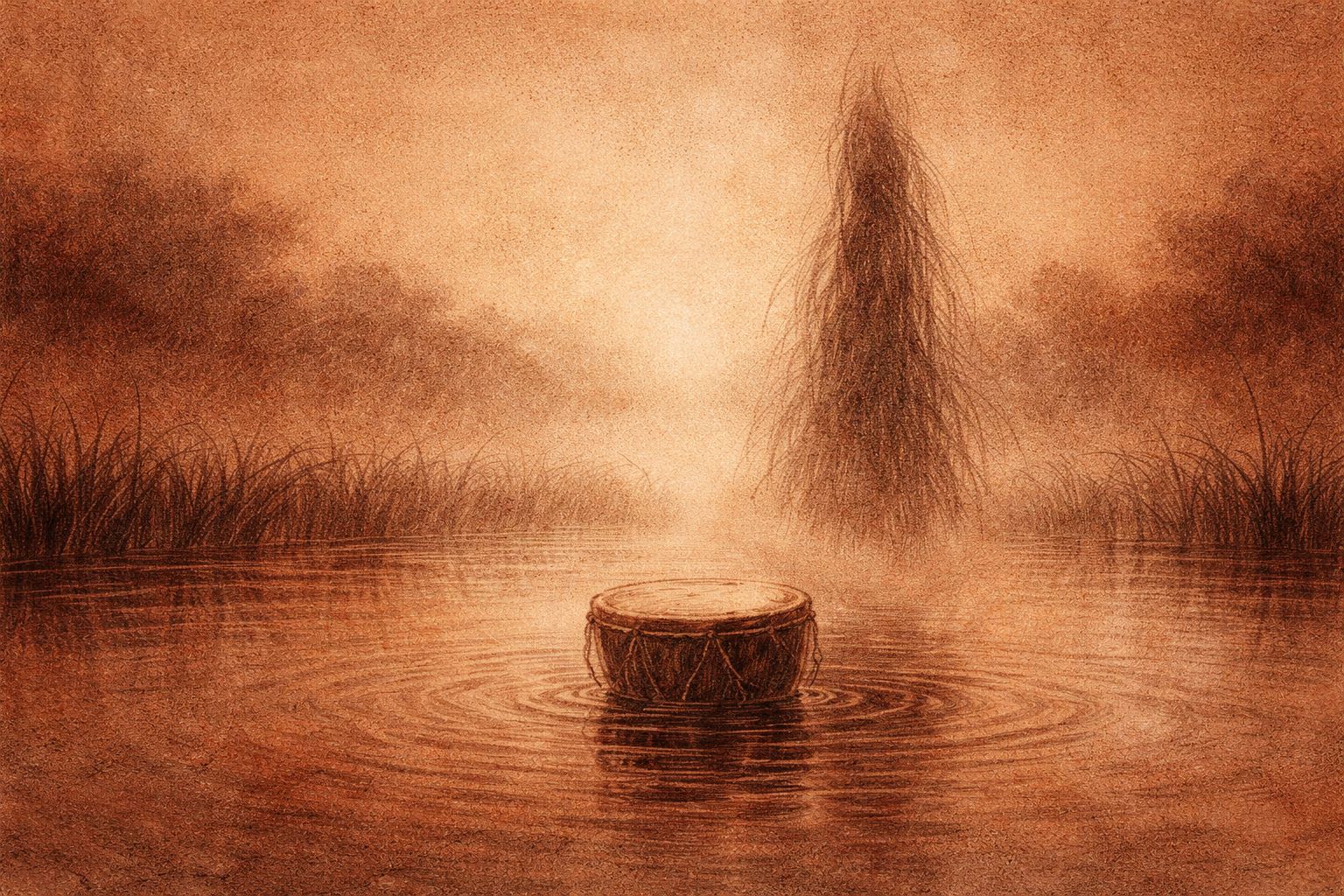
Rice-Ghost and the Seven Drums
3 min read
At harvest, the danger is not hunger but forgetting how to listen.
This folklore retelling speaks of drums struck for silence, of grain taken without gratitude, and of a narrow figure who does not punish—only waits. A tale of pacts made not with spirits, but with attention itself.
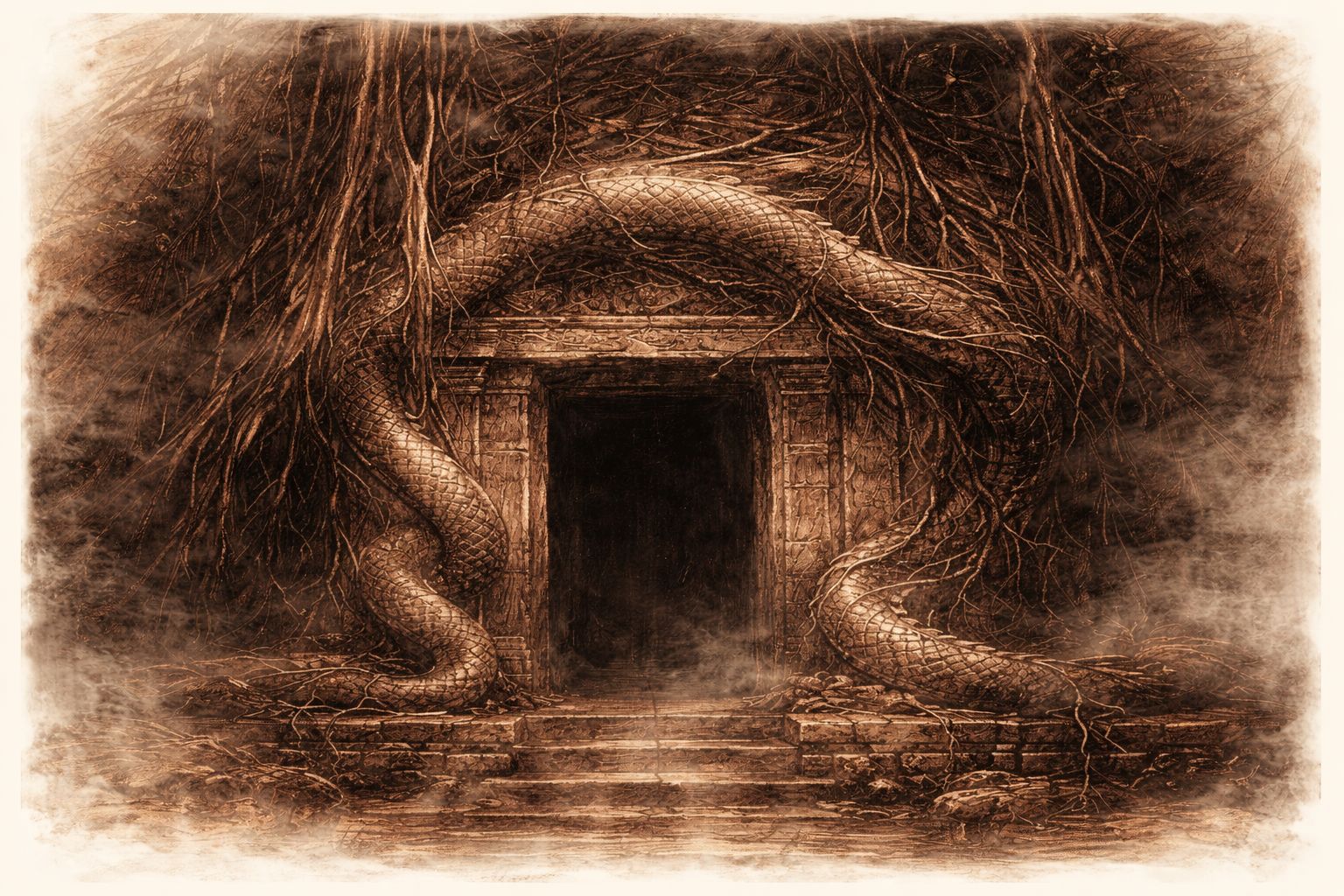
Naga Vow
2 min read
A lost city sleeps in the jungle, its thresholds carved with serpents — not ornament, but law. This vow-poem enters love as sacred hunger: desire as guardianship, devotion as possession, the body speaking without language. A liturgy of heat, roots, rain, and the terrible tenderness of being claimed.
Join My Studio Journal
Receive occasional letters from my studio in Siem Reap—offering a glimpse into my creative process, early access to new fine art prints, field notes from the temples of Angkor, exhibition announcements, and reflections on beauty, impermanence, and the spirit of place.
No noise. No clutter. Just quiet inspiration, delivered gently.
Subscribe and stay connected to the unfolding story.
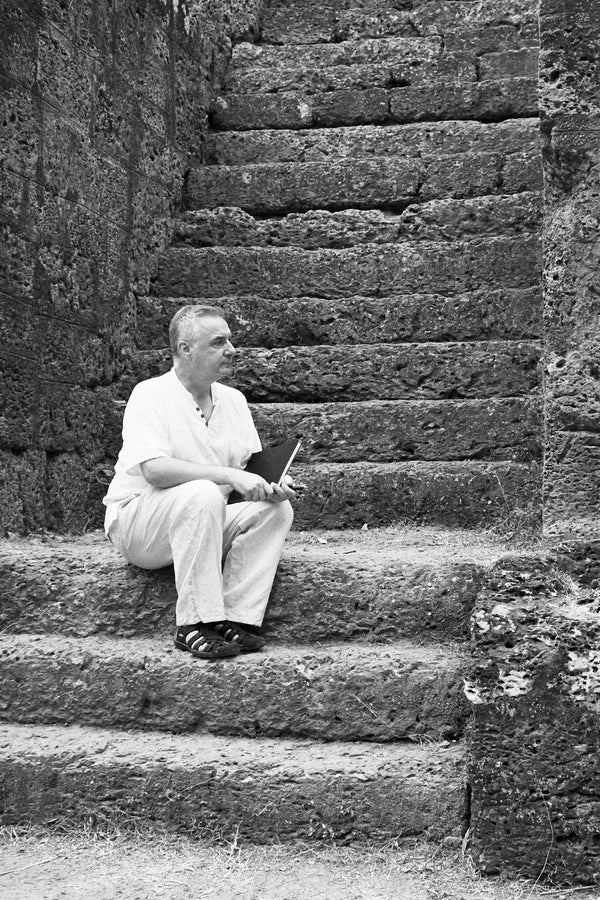
Join My Studio Journal
Receive occasional letters from my studio in Siem Reap—offering a glimpse into my creative process, early access to new fine art prints, field notes from the temples of Angkor, exhibition announcements, and reflections on beauty, impermanence, and the spirit of place.
No noise. No clutter. Just quiet inspiration, delivered gently.
Subscribe and stay connected to the unfolding story.
